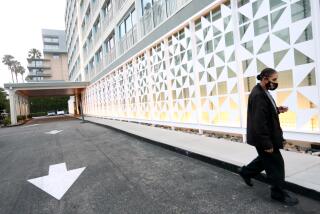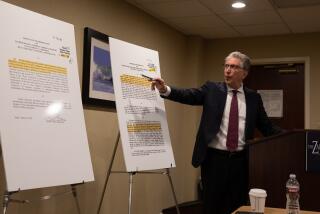Victims of Marcos May Finally Reap Millions
- Share via
In an attempt to avoid a frontal assault on the secrecy of their operations, two large Swiss banks will hold a high-powered bargaining session in Hong Kong that could generate significant payments to 10,000 Filipinos, The Times has learned.
The Filipinos are trying to collect on a $1.9-billion judgment against the estate of late Philippine President Ferdinand E. Marcos, stemming from a massive human rights case.
The Filipinos were awarded the huge judgment last year after a federal jury in Honolulu found that Marcos, who died in exile in 1989, was responsible for major human rights abuses--including torture, murder and “disappearances”--of fellow Filipinos.
The banks--Credit Suisse and Swiss Bancorp--were not defendants in the human rights case. But evidence was introduced at the Honolulu trial that they were holding what is now estimated at $475 million in Marcos-linked funds in the name of dummy Liechtenstein foundations, Marcos cronies and aliases used by Marcos and his wife, Imelda.
If the Hong Kong mediation succeeds and the plaintiffs are able to get money from the Swiss bank accounts, it would constitute a significant precedent, said Joan Fitzpatrick, a University of Washington law professor who is an expert on international human rights law.
Fitzpatrick said it would be the first time that plaintiffs would make a substantial recovery in any of the lawsuits filed in this country under the Alien Tort Claims Act. Originally enacted in 1789, the statute enables victims of torture and other human rights violations to sue for damages in this country if a U.S. court has jurisdiction over the defendant. Several U.S. judges have ruled that they had jurisdiction over the Marcoses after the couple fled their native land in 1986 and settled in Hawaii.
Several lawsuits have been brought under the statute in recent years after advocates of international human rights realized that it could be used by people who had been wronged by foreign officials and might have a better chance of redress in U.S. courts than in their native lands.
While no one expects the Filipinos to obtain the full $1.9 billion awarded them, several sources said it is possible that they could get $100 million, with each person getting an average payment of $10,000. Annual per capita income in the Philippines is $860.
The banks--with the approval of a U.S. federal judge, the Philippine government and the plaintiffs’ lawyer--have recruited Chester A. Crocker, chairman of the U.S. Institute of Peace and former assistant secretary of state in the Ronald Reagan Administration, to supervise the Hong Kong mediation, to be held in December or January.
James P. Linn, the lead U.S. attorney for Imelda Marcos, who is the chief beneficiary of the estate, said he is not sure if she will participate in the mediation but said he has encouraged her to settle. “It’s time the whole thing is settled,” he said. Imelda Marcos, who returned to the Philippines in 1991, was sworn in to the nation’s House of Representatives last month.
If the case is not resolved by mediation, the banks fear that U.S. District Judge Manuel L. Real, the Los Angeles-based judge who presided over the Honolulu trial, will impose significant penalties on them if they continue to maintain that they do not have to disclose how much Marcos-linked cash they have in their vaults.
Swiss government officials are sufficiently concerned about what they view as a challenge to their banking secrecy laws and sovereignty that they have sent two diplomatic letters of protest to Secretary of State Warren Christopher. One of the letters stresses that in response to a request from Philippine authorities after Marcos was deposed in 1986, Swiss courts froze all Swiss assets of the Marcos family, with the purpose of permitting “the repatriation of those assets to the Philippines” if a court there ruled that the assets were stolen property.
Indeed, according to lawsuits filed in Los Angeles and the Philippines, the Marcoses employed a series of elaborate financial schemes to illegally build a fortune exceeding $1 billion during his 20 years in office.
Philippine officials have alleged that the Swiss money is part of the loot stolen by the Marcoses while they ran their country as a racketeering enterprise, a charge Imelda Marcos disputes. The Philippine cases have been pending for several years and remain unresolved. A New York jury acquitted Imelda Marcos of similar criminal charges in 1990.
Documents obtained by the Philippine government from Swiss authorities revealed that the Marcoses deposited at least $356 million in Swiss banks, listing phony foundations as beneficiaries, according to charges lodged in the Philippines in 1991. That sum reputedly has grown to about $475 million.
Thus far, the Philippine government has recovered about $100 million of hidden Marcos assets in the United States--including cash, New York office buildings, two California banks and a Beverly Hills mansion once owned by the actor George Hamilton--as a result of civil lawsuits in Los Angeles and New York. But that is a small portion of what Philippine officials believe the Marcoses took, and authorities reportedly are still searching for hidden assets.
Over the past four years, Judge Real has issued several significant decisions in favor of the Honolulu plaintiffs, prompting the banks to propose the Hong Kong mediation. He ordered the banks and other parties--including Imelda Marcos and her four children--not to transfer, conceal or dissipate the funds or other Marcos-related assets.
In May, Real ruled that Imelda Marcos, her son Ferdinand R. Marcos and her other children had entered into two secret agreements with the Philippine government to divide all assets belonging to the Marcos estate worldwide. Real said that the deals contravened his earlier order barring Marcos and her son from dissipating any of the estate’s assets. The judge noted that these secret arrangements had only come to light after their unauthorized disclosure by a disgruntled Marcos attorney in the Philippines.
The deals provided that the Philippine government would get 75% of the estate’s assets and the Marcoses would get 25%, and hundreds of criminal charges would be dropped against them in the Philippines.
In July, Real assigned the rights to the Marcos-linked Swiss bank accounts to Robert L. Swift, a Philadelphia-based attorney who is representing the human rights plaintiffs.
In an attempt to get the banks to reveal their Marcos-related assets, Swift then filed papers in Los Angeles federal court seeking to collect the entire $1.9-billion judgment from the banks as the agents of the Marcoses. Swift contends that because there is a federal judgment against the banks, the plaintiffs should be able to collect a judgment anywhere in the United States that the banks have offices.
The banks’ U.S. attorneys have filed extensive papers strenuously disputing Swift’s position that they must reveal how much Marcos-linked cash they have or that Swift’s clients can move against the bank’s assets in Los Angeles.
The banks submitted an affidavit from a Swiss banking expert saying the banks could face prosecution in a Swiss court if they make the disclosures.
Real was scheduled to hold a hearing on these issues in Los Angeles federal court last Monday. But after he met with the attorneys in chambers, the hearing was put off until Wednesday in Honolulu.
Linn, Imelda Marcos’ attorney, said that his client is willing to pay $30 million or more to settle the case if the Philippine government is willing to drop hundreds of cases pending against her in Manila.
But another lawyer involved in the case, speaking anonymously, said he thought Marcos would be willing to turn over $100 million of the Swiss bank funds to the human rights plaintiffs and three-fourths of the remaining Swiss money to the Philippine government, while keeping one-fourth for herself and her children, in line with the terms of the earlier secret agreements.
More to Read
Sign up for Essential California
The most important California stories and recommendations in your inbox every morning.
You may occasionally receive promotional content from the Los Angeles Times.










